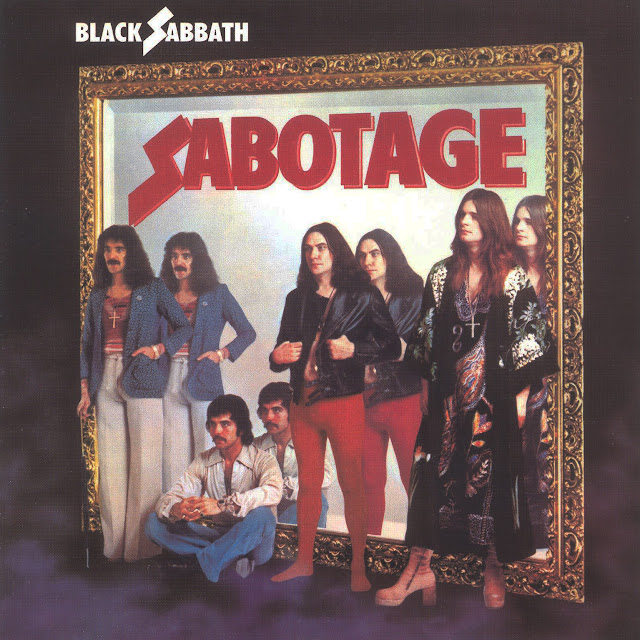Bitrate: 256
mp3
Ripped by: ChrisGoesRock
Artwork Included
Source: Japan 24-Bit Remaster
Sabotage is the sixth studio album by English rock band Black Sabbath, released in July 1975. It was recorded in the midst of litigation with their former manager Patrick Meehan and the stress that resulted from the band's ongoing legal woes infiltrated the recording process, inspiring the album's title. It was co-produced by guitarist Tony Iommi and Mike Butcher.
Black Sabbath began work on their sixth album in February 1975, again in England at Morgan Studios in Willesden, London. The title Sabotage was chosen because the band were at the time being sued by their former management and felt they were being "sabotaged all the way along the line and getting punched from all sides", according to Iommi. Iommi credits those legal troubles for the album's angry, heavier sound.
We were literally in the studio, trying to record, and we'd be signing all these affidavits and everything. That's why it's called Sabotage – because we felt that the whole process was just being totally sabotaged by all these people ripping us off." In his autobiography I Am Ozzy, singer Ozzy Osbourne confirms that "writs were being delivered to us at the mixing desk" and that drummer Bill Ward "was manning the phones." In the liner notes to the 1998 live album Reunion, Butler claimed the band suffered through 10 months of legal cases and admitted, "music became irrelevant to me. It was a relief just to write a song."
Tony Iommi describes the song's dynamics in his autobiography Iron Man: "It starts with an acoustic bit. Then it goes into the up-tempo stuff to give it that dynamic, and it does have a lot of changes to it, including the jam at the end." The final part of "Symptom of the Universe" evolved from an in-studio improvisation, created very spontaneously in a single day and the decision was made to use it in that song.
The brief instrumental "Don't Start (Too Late)" is an acoustic guitar showpiece for Iommi, titled for tape operator David Harris who often despaired at Sabbath being prone to start playing before he was ready.
Sabotage was released on 27 June 1975 and peaked at number 7 in the United Kingdom and at number 28 in the United States. It was certified Silver (60,000 units sold) in the UK by the BPI on 1 December 1975 and Gold in the US on 16 June 1997, but was the band's first release not to achieve platinum status in the US. For the second time, a Black Sabbath album initially saw favourable reviews, with Rolling Stone stating "Sabotage is not only Black Sabbath's best record since Paranoid, it might be their best ever", although later reviewers such as Allmusic noted that "the magical chemistry that made such albums as Paranoid and Volume 4 so special was beginning to disintegrate". Guitarist Yngwie Malmsteen told Nick Bowcott of Guitar Player in 2008 that the riff to "Symptom of the Universe" was the first Tony Iommi riff he ever heard and that "Tony's use of the flat fifth would have got him burned at the stake a couple hundred years ago."
The band toured the US in support of Sabotage in 1975, which included a filmed appearance for the prestigious series Don Kirshner's Rock Concert at the Santa Monica Civic Auditorium. Sabbath played "Killing Yourself To Live", "Hole In The Sky", "Snowblind", "War Pigs" and "Paranoid". During Iommi's guitar solo during "Snowblind", plastic snowflakes were dropped from above on the audience and the band, a gimmick used during the band's live shows during this period. According to the book How Black Was Our Sabbath, "The audience was limited to just a couple thousand fans, and it seemed like the whole of LA got wind of it." Due to the band's expanding use of orchestras and other new sounds in the studio, the tour in support of Sabotage was the first in which Black Sabbath used a full-time keyboardist onstage, Gerald "Jezz" Woodroffe. Black Sabbath toured with openers Kiss, but were forced to cut the tour short in November 1975, after vocalist Osbourne was injured in a motorcycle accident. "Allmusic Rating: ★★★★ +Half ★
The Band:
♦ Ozzy Osbourne – lead vocals
♦ Tony Iommi – all guitar, piano, synthesizer, organ, harp
♦ Terry "Geezer" Butler – bass guitar
♦ Bill Ward – drums, percussion (piano and backing vocals on "Blow on a Jug")
01. "Hole in the Sky" 04:00
02. "Don't Start (Too Late)" (Instrumental) 00:49
03. "Symptom of the Universe" 06:29
04. "Megalomania" 09:46
05. "The Thrill of It All" 05:56
06. "Supertzar" (Instrumental with vocalising choir) 03:44
07. "Am I Going Insane (Radio)" 04:17
08. "The Writ" 08:46
Some versions of Sabotage contain a short hidden track entitled "Blow on a Jug" at the end of "The Writ", recorded at very low volume.
1. Link
or
2. Link
or
3. Link








1 comment:
Always loved this album. Thank you for teaching me the story.
Post a Comment